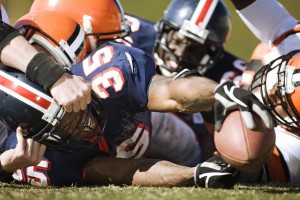NFL Player Lawsuits Raise Awareness about the Long-Term Effects of Head Injuries
As Americans, we are facing a rapidly developing new legal and medical frontier in the area of concussions and head injuries. Each day, we are confronted with new information and insight into the long-term effects of concussions on the brain, along with the potentially deadly consequences of choosing to ignore these maladies. In past decades, concussions sustained while playing sports (particularly football) were considered insignificant. They were generally ignored, and players jumped right back onto the field once the effects wore off. However, the past few years have marked a new era in the NFL (National Football League) as a result of new, game-changing medical knowledge and statistics regarding concussions. The effects of long-term concussions have appeared recently in national headlines as more former players are taking legal action against the NFL, claiming that the league did not take appropriate measures to protect its players against head injuries.
One of the more high-profile lawsuits was recently filed by a group of 15 retired players, headed by Hall of Fame running back Eric Dickerson. The group maintains that the NFL neglected to recognize and protect against the dangers of long-term head trauma to which the players were subjected, leading them to suffer injuries such as migraine headaches, sleeplessness, memory loss, and hearing impairment. Sadly, in the approximately 80 lawsuits brought against the NFL by former players affected by head injuries, there is a consistent theme of injuries: depression, brain damage, memory loss, possible dementia correlations, seizures, eyesight loss, and violent mood swings sometimes resulting in suicide. Jim McMahon, former Chicago Bears Quarterback, is an outspoken critic of the NFL’s approach to concussions, going so far as to claim that the NFL lied to players about the long-term effects of concussions to “get them back out on the field sooner.” McMahon now suffers from extreme memory loss and is among more than 300 former players currently suing the NFL.
The NFL has long fought these attempts to admit to a correlation between concussions and brain damage. In fact, only in 2009 did the league (which was established in 1920) finally recognize that concussions can have long-term effects. In recent years, the league has taken measures to increase field safety for those currently playing, including creating rules concerning blows to the head and improving helmet technology. However, the damage is already permanently done for hundreds of players who suffered head injuries years ago and are just now beginning to feel the effects. Most of these players and their families feel that the NFL and the team owners used them to boost their own incredible profits, hid evidence of the terrible severity of concussions, and then attempted to leave them without any medical coverage or financial compensation.
The recent influx of litigation may have drastic implications for the NFL and the business it generates. It is highly unlikely that football would vanish from the landscape of American sports, given that the risk of head injury is inherent in the game. There is, however, a greater issue to address, which is determining how the law and the community as a whole can address and prevent debilitating head injuries. Concussions do not only occur in professional sports such as football; they also affect individuals in everyday life. A speeding fastball may hit a high school baseball player in the helmet and seem innocuous at first, just as the victim of a slip and fall or car accident who is hit in the head may not experience any symptoms for days, weeks, months, or even years.
In light of the potentially devastating and long-term consequences of any head trauma, such injuries must be taken seriously and treated with the utmost care. If there is a silver lining to the suffering of hundreds of football players, it is the awareness raised by their litigation against the NFL of the long-term effects of head trauma. Based in the Tampa Bay, Florida area with offices in Clearwater, Tampa, St. Petersburg, Tarpon Springs, and Trinity, the experienced personal injury attorneys at PERENICH The Law Firm will apply the knowledge gleaned from these lawsuits, including numerous case studies and head injury statistics, to legally protect and compensate you or your loved ones suffering physical and financial loss as a result of a sustained concussion or other head trauma.


